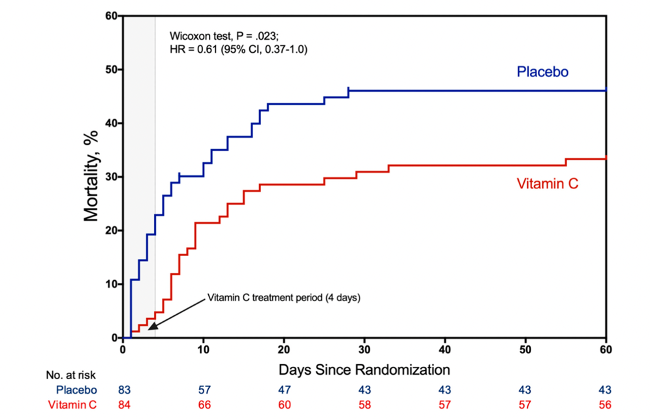Vitamin C is an important antioxidant and an enzymatic cofactor that helps many important biological reactions. Most vertebrates can synthesize vitamin C and can increase its synthesis during stress. However, humans have lost the ability to synthesize vitamin C (Vitamin C for the treatment of sepsis).
Sepsis is a leading cause of morbidity and mortality worldwide due to a life-threatening organ dysfunction resulting from a dysregulated host response to infection, leading to massive production of reactive oxygen species and causing extensive endothelial, cellular, and mitochondrial damage, leading to progressive organ failure. A particularly devastating complication of sepsis is acute respiratory distress syndrome (ARDS), a severe form of sepsis-induced lung injury. Patients with sepsis-induced lung injury spend more time on mechanical ventilators and have a higher mortality rate than patients with other forms of acute lung injury.
Sepsis is associated with an acute deficiency of vitamin C. More recently, vitamin C has emerged as a potential therapeutic agent in the treatment of sepsis. Its physiological effects in sepsis include attenuation of oxidative stress and inflammation, improving vasopressor synthesis, enhancing immune cell function, improving endovascular function, and epigenetic immunologic modifications. Several clinical trials have demonstrated the safety of vitamin C, and two recent studies have shown promising data on the improvement of mortality (as shown in the figure below). With further studies, it is likely that vitamin C could become the standard of care for the treatment of sepsis.

In addition, emerging evidence suggests that the combination of vitamin C, corticosteroids, and thiamine may act synergistically to reverse sepsis-induced organ dysfunction and improve the outcome of patients with severe sepsis and septic shock. Moreover, at the recommended doses, this combination of drugs is without known side effects. This inexpensive and readily available drug combination has the potential to reduce global mortality from sepsis.
Kashiouris, M. G., L’Heureux, M., Cable, C. A., Fisher, B. J., Leichtle, S. W., & Fowler, A. A. (2020). The emerging role of vitamin C as a treatment for sepsis. Nutrients, 12(2), 292.
Marik, P. E. (2018). Vitamin C for the treatment of sepsis: the scientific rationale. Pharmacology & therapeutics, 189, 63-70. [Link]
